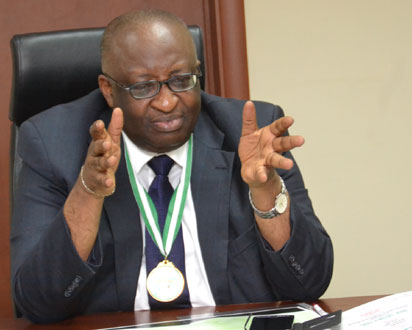Akpan Ekpo, a professor of economics, is Director General, West African Institute for Financial and Economic Management (WAIFEM). He speaks on the warning by the CBN Governor, Mr. Godwin Emefiele, that Nigeria’s economy may go into a recession in 2016.

The CBN Governor hinted, last week, that Nigeria’s economy may go into recession in 2016. What is your take on this?
The economy is not yet in a recession but in slow down. The economy is under severe stress now. But if there is no growth in two consecutive quarters, it means the economy can enter into a recessionary phase. The CBN is saying that with the slow down in growth, coupled with the declining oil revenue, if the economy is not diversified, then a recession can set in by 2016. For now, the economy needs robust fiscal policy to support the monetary and exchange rate policies of the CBN.
What is the difference between an economy going into recession or depression?
A depression is a prolonged recession and no two of them are alike. A depression is a prolonged recession period, meaning an economy will experience no growth in output, there will be decline in productivity, no investment, high inflation rate, high unemployment ratio, increased poverty and general misery among the bulk of the population.
What are the signs if an economy is going into recession?
Though our economy is not in recession now, the misery index has been rising. To me, progress in all sectors has been very marginal, unemployment is at the level of national crisis, the real sector is in comatose. In fact, in my opinion, the real sector is “dead”. Looking at the social sector, our healthcare system is in disarray. Many Nigerians now go to India, Dubai, America and other countries for treatment. The public school system at all levels is not qualitative enough and mushroom private schools are springing up everywhere. At 55years of independence, the economy is still at a cross road, because we have not made significant progress.
In 1960, the leaders promised to give Nigerians better education, healthcare, potable water, housing and other basic needs of life, and those things were available then, but they promised to do better. Few years after, everything collapsed. 55years after, government is still saying it will provide constant electricity and those basic needs. So, the basic things of life have eluded almost 85percent of Nigerians. Actually, what I call human capital indicators, another social indices, have eluded us despite the growth in Gross Domestic Product (GDP).
Infact, in certain areas, the economy is deteriorating; for example, the quality of education like I said, has declined such that, many parents now send their wards to study in Ghana. In the 60s/70s, University College Hospital, Ibadan was rated among top 20 in the world, but today Nigeria is experiencing medical tourism.
Can you tell us precisely if our economy has experienced recession before?
Yes, every market economy goes through a business cycle. A dependent capitalist economy like Nigeria, cannot escape recession or depression, because it is a recurring decimal in economies. If nothing else, Nigeria’s economy would experience recession as a client based on dependent and periphery nature of its system.
The economy experienced recession in the 1970s, 1980s and 1990s. The global economic crisis of 2007/2008 affected Nigeria. If any known market economy would have escaped recession, it would be US economy, but, despite prudent management of the US economy, it experienced periodic recessions and the last global economic recession was triggered by the collapse of the sub-mortgage sector.
Can you give us statistical overview of growth rate in major sectors of the economy in the last 55years?
After independence, from 1962 to 1968, the economy grew positively by almost 8 percent; from 1970 to about 1977, the same growth rate was recorded. After that came a slight decline up to 1984, of about 3.2 percent. From 1984 to 1985, there was no growth, or there was negative growth, as the economy experienced a lot of problems. All attempts to stabilise the economy were unsuccessful. In 1986, we adopted Structural Adjustment Programme (SAP) with a view to enhancing growth, to reverse negative growth and to put the economy on path of sustainable growth with minimal inflation. But SAP made the situation worse.
How?
Everything was deregulated at the same time. For instance, the financial market that was not well developed was deregulated. Everything was based on Marginal Cost Pricing for the market forces of demand and supply to determine everything, but the market was not even there. All that period of growth and non-growth, there was still no development, as a lot of people were not enjoying high standard of living.
When we abandoned SAP in 1992/1993, we tried Guided Deregulation of the economy from 1993 to 1998. The economy was doing well then because all the macroeconomic fundamentals moved in the right direction. We had positive growth, exchange rate was stable, about N80 – N82; foreign reserve could finance imports for more than six months; inflation was moderate; unemployment was not at alarming rate like now, yet most Nigerians still lacked basic amenities.
Can you give us the statistical analysis of the growth rate under civilian administrations from 1999?
Civilian rule (democracy) came in 1999 and government intensified efforts to build a market economy from 1999 to 2007. The economy had positive growth rate of about 4.5 percent, which was higher than the population growth rate. There were attempts to better manage the economy; for example, the Fiscal Responsibility Act and Public Procurement Act were passed, among other legislations in a bid to put in place roles rather than discretion. For instance, we had the Medium Term Expenditure Framework, which was an attempt to ensure sanity in the fiscal side, to curb fiscal rascality (excessive spending).
Was there an inflationary situation in the economy during that period?
Inflation was double digits but within acceptable threshold and the economy was stable, as the macroeconomic fundamentals moved in the right direction.
Macro stability in whose interest? Was such stability in the interest of the elites, the middle class or the poor in the society?
Well, there was stability in the economy, yet Nigerians lacked the basic amenities of life. Only 20 percent of Nigerians enjoyed the country’s resources, because poverty incidence continued to rise. However, for the first time in many years, there was evidence to plan the economy by giving a strategic push as enunciated by the National Economic Empowerment Development Strategy (NEEDS) document. So, there were attempts to implement what NEEDS called for. For instance, we had banking consolidation, but through out that period, infrastructure remained a big problem, epileptic power supply. The economy was still generator-driven, even up till now.
So, the 5.5 percent growth, which continues till 2015, makes one to wonder what drives the growth, with over 24 percent unemployment. There was growth but no development. It was a jobless growth, as all major social indices were negative. Nigeria continues to be a mono-culture economy, depending heavily on crude oil export, which is unhealthy for the system. We depend on an exiguous source of revenue to finance development.
We have no control over the price and the output of oil. How can you plan an economy on the source of revenue you have no control over? So, the structure of the economy becomes not only export dependent but on a resource that is non-renewable. For progress to be made, we must change the structure of the economy and move away from oil to agriculture, chemicals, pharmaceutical industry, develop our iron/steel industry and revamp the machine tools industry.
What practical approach do you advise the new government to adopt in order to revamp the whole system?
We have to be honest. President Muhammadu Buhari cannot change what has been going wrong in the economy for over 55 years in just four years, because it will take a magician to do that. Buhari can have a good start by changing the structure of the economy to a path of sustainable growth.
First, he must be honest with Nigerians to agree that things are bad. Second, he should have an economic blue print that supports a developmental-state approach to changing the structure of the economy. Whatever he is doing, he must focus on creation of jobs, qualitative human capital, provision of infrastructure like constant power supply, to ensure that at least 85 percent Nigerians enjoy the resources.
In doing that, he needs resources. So, he must ensure that the refineries are working to conserve foreign reserve, which can be used to finance some projects. He has to show practically that the economy is no longer dependent on oil. He should demystify the oil sector by encouraging modern agriculture, housing /construction, Small and Medium Enterprises (SMEs); entrepreneurs should have access to credit for expansion. Ideas and innovation must be converted into goods and services.
He should ensure aggressive monetary policy, by forcing down the lending rate, build strong institutions for processes to work. For instance, only a developmental-state philosophy can fight against the global system of finance capital, which relies heavily on speculation. We cannot fight it with the neo-liberal economic framework that we have in place now, because it will make our economy unstable.
At 55years of independence, are we operating the federal structure the way we ought to? It is imperative for us to ask ourselves this question, because we need competitive federalism, where states can compete among themselves and also collaborate. The states must be given economic independence.
Creation of states should not arise, because the more states are created, the more problems. Many states are not economically viable but were created to reduce ethnic tension. States must be able to generate their own revenue without depending on federal allocation. Now the IGR for states is less than 14 percent. Only two states like Lagos and Kano can survive without allocation from the federal. They can survive for a short time, not for too long.
Also, women empowerment through education of the girl-child should be part of Buhari’s administration. If you develop a woman, you develop a nation, and violence against women must be given serious attention.







